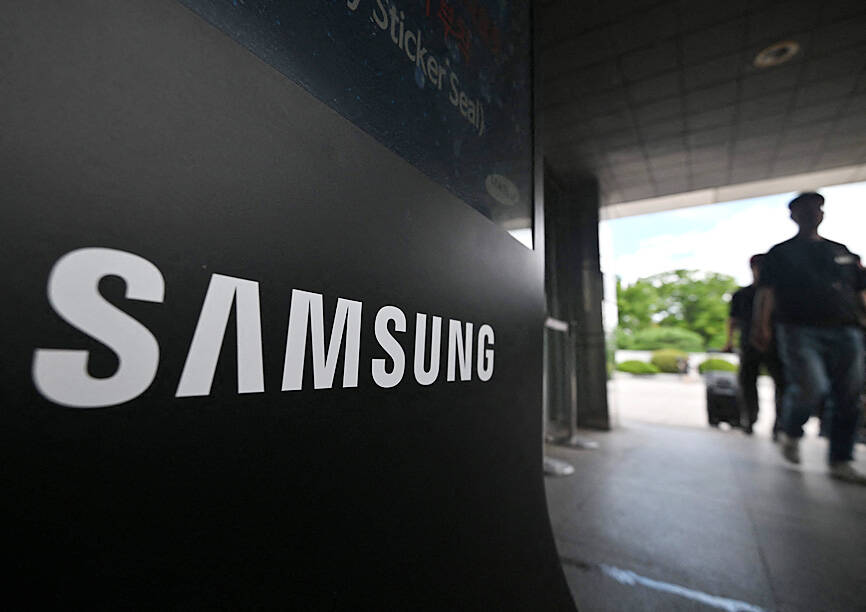Samsung Electronics Co must adopt a “do-or-die” mindset to confront the challenges posed by artificial intelligence (AI) that are upending the industry, Yonhap news cited chairman Jay Y. Lee as saying yesterday.
Samsung has been struggling to meet Nvidia Corp’s requirements, as rival SK Hynix Inc has become the titan’s main supplier of high-bandwidth memory (HBM) chips for its AI graphics processing units.
The world’s largest memorychip maker in October last year acknowledged that it was facing a “crisis” and admitted questions had arisen about its “fundamental technological competitiveness and the future of the company.”

Photo: Jung Yeon-je, AFP
“Samsung is facing a do-or-die survival issue. We need to reflect deeply from the top,” Lee was quoted as saying during a training for top executives.
Lee’s message was to emphasize that “what matters is not the crisis itself, but the attitude in dealing with it,” Yonhap reported, citing company sources.
Lee also said that “even if it means sacrificing short-term profits, we must invest for the future,” Yonhap added.
A Samsung spokesperson yesterday said that Lee had not “said the message himself” without giving further details.
Separately, South Korean semiconductor exports to China plunged last month, deepening concerns about a cooling in global demand already threatened by US tariffs, as Washington steps up its restrictions on technology supplies to Beijing.
Chip sales to the world’s second-largest economy, including Hong Kong, fell 31.8 percent from a year earlier, the South Korean Ministry of Trade, Industry and Energy said on Sunday. That is bigger than the 22.5 percent contraction reported for January and comes after a rally last year that helped fuel South Korea’s economic growth.
The decline at the beginning of this year coincides with the US implementing its export restrictions on cutting-edge semiconductors to China. The US Department of Commerce in December last year slapped fresh curbs on the sale of HBM chips to China.
South Korea’s total semiconductor exports slipped 3 percent from a year earlier last month, ministry data showed.
Declining prices in conventional memory chips and a technological transition in semiconductor production were among reasons the growth in exports slowed, the ministry said.
Additional reporting by Bloomberg

SELL-OFF: Investors expect tariff-driven volatility as the local boarse reopens today, while analysts say government support and solid fundamentals would steady sentiment Local investors are bracing for a sharp market downturn today as the nation’s financial markets resume trading following a two-day closure for national holidays before the weekend, with sentiment rattled by US President Donald Trump’s sweeping tariff announcement. Trump’s unveiling of new “reciprocal tariffs” on Wednesday triggered a sell-off in global markets, with the FTSE Taiwan Index Futures — a benchmark for Taiwanese equities traded in Singapore — tumbling 9.2 percent over the past two sessions. Meanwhile, the American depositary receipts (ADRs) of Taiwan Semiconductor Manufacturing Co (TSMC, 台積電), the most heavily weighted stock on the TAIEX, plunged 13.8 percent in

A wave of stop-loss selling and panic selling hit Taiwan's stock market at its opening today, with the weighted index plunging 2,086 points — a drop of more than 9.7 percent — marking the largest intraday point and percentage loss on record. The index bottomed out at 19,212.02, while futures were locked limit-down, with more than 1,000 stocks hitting their daily drop limit. Three heavyweight stocks — Taiwan Semiconductor Manufacturing Co (TSMC, 台積電), Hon Hai Precision Industry Co (Foxconn, 鴻海精密) and MediaTek (聯發科) — hit their limit-down prices as soon as the market opened, falling to NT$848 (US$25.54), NT$138.5 and NT$1,295 respectively. TSMC's

TARIFFS: The global ‘panic atmosphere remains strong,’ and foreign investors have continued to sell their holdings since the start of the year, the Ministry of Finance said The government yesterday authorized the activation of its NT$500 billion (US$15.15 billion) National Stabilization Fund (NSF) to prop up the local stock market after two days of sharp falls in reaction to US President Donald Trump’s new import tariffs. The Ministry of Finance said in a statement after the market close that the steering committee of the fund had been given the go-ahead to intervene in the market to bolster Taiwanese shares in a time of crisis. The fund has been authorized to use its assets “to carry out market stabilization tasks as appropriate to maintain the stability of Taiwan’s

STEEP DECLINE: Yesterday’s drop was the third-steepest in its history, the steepest being Monday’s drop in the wake of the tariff announcement on Wednesday last week Taiwanese stocks continued their heavy sell-off yesterday, as concerns over US tariffs and unwinding of leveraged bets weighed on the market. The benchmark TAIEX plunged 1,068.19 points, or 5.79 percent, to 17,391.76, notching the biggest drop among Asian peers as it hit a 15-month low. The decline came even after the government on late Tuesday authorized the NT$500 billion (US$15.2 billion) National Stabilization Fund (國安基金) to step in to buoy the market amid investors’ worries over tariffs imposed by US President Donald Trump. Yesterday’s decline was the third-steepest in its history, trailing only the declines of 2,065.87 points on Monday and